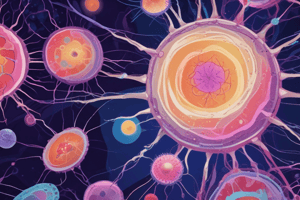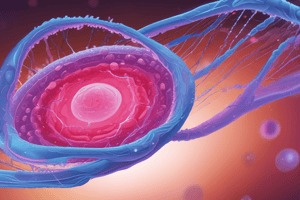Podcast
Questions and Answers
What is the primary goal of regenerative medicine?
What is the primary goal of regenerative medicine?
What is the characteristic of stem cells that allows them to divide and give rise to more stem cells?
What is the characteristic of stem cells that allows them to divide and give rise to more stem cells?
Which type of stem cells is derived from embryos and has the ability to differentiate into all cell types in the body?
Which type of stem cells is derived from embryos and has the ability to differentiate into all cell types in the body?
What is the application of stem cells in regenerative medicine that involves using stem cells to create new tissues and organs for transplantation?
What is the application of stem cells in regenerative medicine that involves using stem cells to create new tissues and organs for transplantation?
Signup and view all the answers
What is the potential challenge of using stem cells in regenerative medicine, where the body's immune system may reject transplanted stem cells?
What is the potential challenge of using stem cells in regenerative medicine, where the body's immune system may reject transplanted stem cells?
Signup and view all the answers
What is the characteristic of embryonic stem cells that allows them to differentiate into all cell types in the body?
What is the characteristic of embryonic stem cells that allows them to differentiate into all cell types in the body?
Signup and view all the answers
What is the application of stem cells in regenerative medicine that involves using stem cells to model diseases and develop new treatments?
What is the application of stem cells in regenerative medicine that involves using stem cells to model diseases and develop new treatments?
Signup and view all the answers
What is the type of stem cells that is derived from adult cells that have been reprogrammed to have pluripotent properties?
What is the type of stem cells that is derived from adult cells that have been reprogrammed to have pluripotent properties?
Signup and view all the answers
Which of the following is a characteristic of endogenous organ regeneration?
Which of the following is a characteristic of endogenous organ regeneration?
Signup and view all the answers
What is the primary mechanism of liver regeneration?
What is the primary mechanism of liver regeneration?
Signup and view all the answers
Which of the following is a challenge in organ regeneration?
Which of the following is a challenge in organ regeneration?
Signup and view all the answers
What is the goal of stem cell therapies in organ regeneration?
What is the goal of stem cell therapies in organ regeneration?
Signup and view all the answers
Which type of organ regeneration involves the use of external factors?
Which type of organ regeneration involves the use of external factors?
Signup and view all the answers
What is the role of biomaterials in organ regeneration?
What is the role of biomaterials in organ regeneration?
Signup and view all the answers
Which of the following is an example of organ regeneration?
Which of the following is an example of organ regeneration?
Signup and view all the answers
What is the potential benefit of gene editing in organ regeneration?
What is the potential benefit of gene editing in organ regeneration?
Signup and view all the answers
Study Notes
What is Regenerative Medicine?
- A branch of medicine that focuses on repairing or replacing damaged or diseased cells, tissues, and organs to restore normal function
- Aims to promote the body's natural healing processes or create new functional tissues to replace damaged ones
What are Stem Cells?
- Undifferentiated cells that have the ability to differentiate into various cell types
- Two main types: embryonic stem cells and adult stem cells
- Characteristics:
- Self-renewal: ability to divide and give rise to more stem cells
- Multipotency: ability to differentiate into multiple cell types
- Pluripotency: ability to differentiate into all cell types in the body
Types of Stem Cells
-
Embryonic Stem Cells:
- Derived from embryos
- Pluripotent, meaning they can differentiate into all cell types in the body
- Controversial due to ethical concerns surrounding the use of human embryos
-
Adult Stem Cells:
- Found in adult tissues, such as bone marrow, fat, and blood
- Multipotent, meaning they can differentiate into multiple cell types, but not all
- Less controversial than embryonic stem cells
-
Induced Pluripotent Stem Cells (iPSCs):
- Derived from adult cells that have been reprogrammed to have pluripotent properties
- Can differentiate into all cell types in the body
- Avoids ethical concerns surrounding embryonic stem cells
Applications of Stem Cells in Regenerative Medicine
- Cell Therapy: using stem cells to replace or repair damaged cells and tissues
- Tissue Engineering: using stem cells to create new tissues and organs for transplantation
- Disease Modeling: using stem cells to model diseases and develop new treatments
- Gene Therapy: using stem cells to deliver healthy copies of a gene to replace a faulty one
Challenges and Limitations
- Immune Rejection: the body's immune system may reject transplanted stem cells
- Tumorigenicity: the potential for stem cells to form tumors
- Scalability: difficulty in large-scale production of stem cells
- Ethical Concerns: controversy surrounding the use of embryonic stem cells and concerns about the potential misuse of stem cell technology
Regenerative Medicine
- Focuses on repairing or replacing damaged or diseased cells, tissues, and organs to restore normal function
- Aims to promote the body's natural healing processes or create new functional tissues to replace damaged ones
Stem Cells
- Undifferentiated cells that have the ability to differentiate into various cell types
- Characteristics:
- Self-renewal: ability to divide and give rise to more stem cells
- Multipotency: ability to differentiate into multiple cell types
- Pluripotency: ability to differentiate into all cell types in the body
Embryonic Stem Cells
- Derived from embryos
- Pluripotent, meaning they can differentiate into all cell types in the body
- Controversial due to ethical concerns surrounding the use of human embryos
Adult Stem Cells
- Found in adult tissues, such as bone marrow, fat, and blood
- Multipotent, meaning they can differentiate into multiple cell types, but not all
- Less controversial than embryonic stem cells
Induced Pluripotent Stem Cells (iPSCs)
- Derived from adult cells that have been reprogrammed to have pluripotent properties
- Can differentiate into all cell types in the body
- Avoids ethical concerns surrounding embryonic stem cells
Applications of Stem Cells in Regenerative Medicine
- Cell Therapy: replacing or repairing damaged cells and tissues
- Tissue Engineering: creating new tissues and organs for transplantation
- Disease Modeling: modeling diseases and developing new treatments
- Gene Therapy: delivering healthy copies of a gene to replace a faulty one
Challenges and Limitations
- Immune Rejection: the body's immune system may reject transplanted stem cells
- Tumorigenicity: the potential for stem cells to form tumors
- Scalability: difficulty in large-scale production of stem cells
- Ethical Concerns: controversy surrounding the use of embryonic stem cells and concerns about the potential misuse of stem cell technology
Organ Regeneration
Definition
- Organ regeneration is a biological process that replaces or regenerates damaged or missing organs to restore normal function.
Types of Organ Regeneration
- Endogenous regeneration: the body's natural ability to regenerate organs through stem cells and signaling pathways, which allows for self-healing and tissue repair.
- Exogenous regeneration: the use of external factors, such as stem cells, growth factors, and biomaterials, to stimulate organ regeneration, which involves the use of external agents to enhance regeneration.
Mechanisms of Organ Regeneration
- Stem cell-mediated regeneration: stem cells differentiate into specific cell types to replace damaged tissue, allowing for the regeneration of new tissue.
- Tissue engineering: the use of biomaterials and growth factors to create a scaffold for tissue regeneration, which provides a framework for tissue growth.
- Bioactive molecules: the use of growth factors, hormones, and other signaling molecules to stimulate regeneration, which triggers the regeneration process.
Examples of Organ Regeneration
- Liver regeneration: the liver has a natural ability to regenerate itself through endogenous mechanisms, allowing for the regeneration of liver tissue.
- Kidney regeneration: research has focused on the use of stem cells and biomaterials to regenerate kidney tissue, which aims to replace damaged kidney tissue.
- Heart regeneration: scientists are exploring the use of stem cells and growth factors to regenerate heart tissue, which aims to repair damaged heart tissue.
Challenges and Limitations
- Scalability: scaling up organ regeneration to replace entire organs is a significant challenge, as it requires the regeneration of large amounts of tissue.
- Immune rejection: the risk of the immune system rejecting regenerated tissue is a major limitation, as it can lead to graft failure.
- Functional integration: ensuring that regenerated tissue integrates properly with existing tissue is crucial, as it affects the functionality of the regenerated organ.
Current Research and Future Directions
- Stem cell therapies: ongoing research into the use of stem cells for organ regeneration is a promising area of research, with potential applications in regenerative medicine.
- Biomaterials and scaffolds: development of biomaterials and scaffolds to support tissue regeneration is a critical area of research, as it provides a framework for tissue growth.
- Gene editing: the use of gene editing technologies to enhance organ regeneration is a potential area of research, with potential applications in precision medicine.
Studying That Suits You
Use AI to generate personalized quizzes and flashcards to suit your learning preferences.
Description
Explore the basics of regenerative medicine, its goal of repairing or replacing damaged cells, and the characteristics of stem cells, including their ability to differentiate into various cell types.





